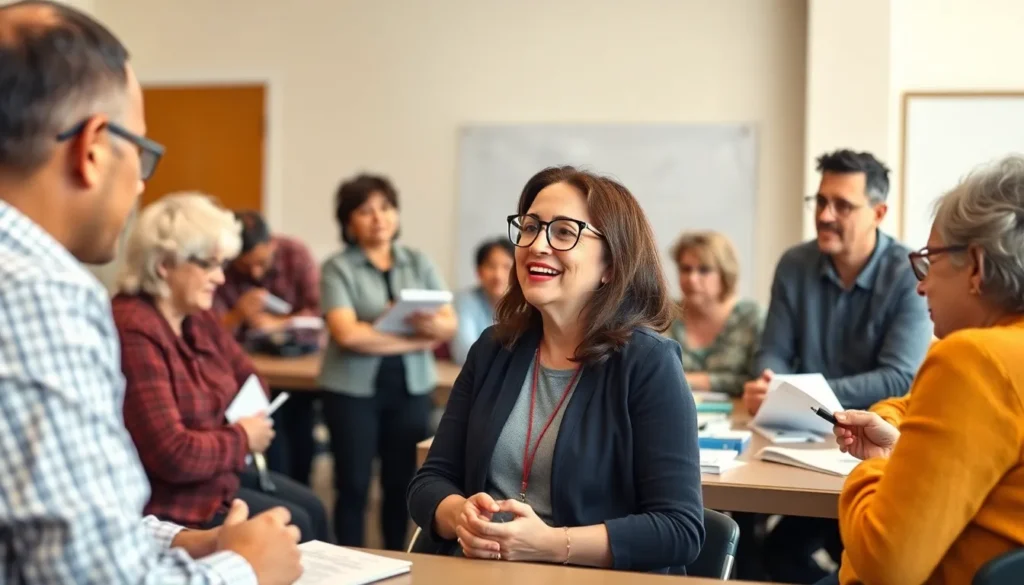In a world where avocado toast can cost as much as a mortgage payment, understanding finances has never been more crucial. Financial literacy isn’t just a buzzword; it’s the secret sauce to making smart money moves. Whether it’s budgeting for that dream vacation or figuring out how to avoid drowning in student loans, knowing the ins and outs of personal finance can save a lot of headaches—and maybe even a few bucks.
Table of Contents
ToggleWhat Is Financial Literacy?
Financial literacy refers to the understanding and skills that enable individuals to make informed financial decisions. It includes knowledge about budgeting, saving, investing, and managing debt. Equipped with this knowledge, a person can effectively navigate personal finance challenges.
Understanding how to read financial statements is crucial. This means grasping concepts such as income, expenses, assets, and liabilities. Knowing the difference between these terms helps in evaluating one’s financial health. Individuals with strong financial literacy can identify critical financial opportunities and risks.
Budgeting plays a key role in financial literacy. Creating and adhering to a budget helps track spending and savings. It allows individuals to set realistic financial goals, whether it’s saving for a car or planning for retirement. Various budgeting methods exist, including zero-based and envelope budgeting, each suited to different financial situations.
Investing knowledge is also a vital component of financial literacy. Understanding different types of investments, such as stocks, bonds, and mutual funds, empowers individuals to grow their wealth. Knowing how to diversify investments can mitigate risks and enhance overall returns.
Managing debt is another essential area of focus. Recognizing the difference between good and bad debt assists in making responsible borrowing decisions. Individuals with financial literacy understand interest rates and repayment terms, which helps avoid costly mistakes.
In today’s economy, being financially literate is indispensable. It fosters better money management and, ultimately, a more secure financial future. With the right skills, individuals can confidently tackle their personal finance goals.
Importance of Financial Literacy

Understanding financial literacy drives individual and societal progress. It influences informed decision-making regarding personal finance, budgeting, and investing.
Benefits for Individuals
Empowerment stems from financial literacy. Individuals gain confidence in managing their finances, which leads to improved budgeting and savings practices. Knowledge of investing opens avenues for wealth growth and risk management. Strong financial skills aid in navigating debt responsibly, minimizing costly mistakes related to interest and repayment terms. Increased financial literacy correlates with reduced stress and enhanced mental well-being, fostering a sense of security in personal finance decisions. Ultimately, educated individuals are better equipped to meet their financial goals and build a prosperous future.
Benefits for Society
Financially literate populations contribute to stable economies. Communities with higher financial literacy experience lower levels of poverty and increased economic participation. Individuals make smarter spending and saving choices, benefiting local businesses and stimulating economic growth. Awareness of budgeting and investing encourages responsible financial behavior, reducing dependency on social services. A financially educated society cultivates resilience against economic downturns, as informed citizens are better able to adapt to changing circumstances. Overall, financial literacy enhances collective well-being by promoting sustainable financial practices and greater economic stability.
Key Components of Financial Literacy
Financial literacy encompasses several vital components that empower individuals to manage their finances effectively. Understanding these components leads to informed decision-making and financial stability.
Budgeting and Saving
Budgeting forms the foundation of financial literacy. Tracking income and expenses allows individuals to understand their spending patterns. Various budgeting techniques exist, such as zero-based and envelope budgeting, which help allocate resources efficiently. Setting realistic savings goals becomes achievable through consistent budgeting practices. Saving regularly fosters a safety net for emergencies and future opportunities, ultimately contributing to long-term financial health.
Understanding Credit and Debt
Credit knowledge significantly impacts financial decisions. Individuals should grasp the difference between good and bad debt. Good debt, like student loans, can lead to future wealth, while bad debt, such as high-interest loans, typically jeopardizes financial health. Awareness of credit scores plays a crucial role, as healthy scores enable access to favorable borrowing terms. Understanding interest rates and repayment strategies helps avoid pitfalls and minimizes costs over time.
Investing Basics
Investing knowledge empowers individuals to grow their wealth. Diversifying investments across stocks, bonds, and mutual funds can mitigate risk. Familiarity with concepts like compound interest enhances the potential for better returns. Long-term investment strategies often yield significant benefits, emphasizing the importance of patience and discipline. Individuals prepared to invest wisely can contribute to their financial independence and security.
Challenges to Achieving Financial Literacy
Several obstacles impede the journey toward financial literacy. These challenges often stem from socioeconomic factors and educational barriers, impacting individuals’ ability to understand and manage their finances effectively.
Socioeconomic Factors
Socioeconomic status significantly influences financial literacy levels. Individuals from lower-income backgrounds frequently lack access to quality financial education resources. Limited financial stability often translates to an increased focus on immediate needs, diminishing the capacity for long-term financial planning. Furthermore, financial stress can hinder one’s ability to learn and apply financial concepts. Underprivileged communities may even face systemic barriers that restrict exposure to practical financial experiences, preventing mastery of essential skills. The disparities highlight the urgent need for targeted financial literacy initiatives that address these issues.
Educational Barriers
Educational barriers contribute to the financial literacy gap. Schools often lack comprehensive financial education programs, leaving students unprepared for real-world money management. Many curriculums do not include subjects that explain budgeting, saving, and investing fundamentals. Parents may also feel unequipped to teach their children about finances due to their own financial literacy limitations. Inadequate access to workshops, seminars, and online resources further exacerbates the situation. Prioritizing financial education within school systems can bridge this gap, equipping future generations with the knowledge they need to make informed decisions.
Strategies to Improve Financial Literacy
Improving financial literacy involves utilizing various resources and strategies. Engaging with community programs enhances understanding of financial principles.
Community Programs
Community programs play a significant role in boosting financial literacy. Local organizations often offer workshops, seminars, and one-on-one counseling. Participants learn budgeting techniques, saving strategies, and debt management skills. Federal credit unions and nonprofit agencies frequently provide free resources tailored to diverse financial backgrounds. Programs such as these not only educate but also foster community support. Group discussions and activities create a collaborative environment, encouraging individuals to share experiences. By participating in community programs, people gain practical knowledge and confidence in handling personal finances.
Online Resources and Tools
Online resources and tools offer accessible financial education for individuals everywhere. Websites like Khan Academy and MyMoney.gov provide free courses on budgeting, saving, and investing. Interactive budgeting apps allow users to track expenses and set savings goals in real time. Financial podcasts and YouTube channels present expert insights and discussions on the latest trends in finance. Online calculators assist with loan payments and retirement savings, making complex calculations straightforward. Engaging with these digital platforms empowers individuals to take control of their financial futures effectively. The convenience of online resources ensures that anyone, regardless of their schedule, can prioritize their financial literacy.
Financial literacy is a vital skill that shapes individual and societal progress. It empowers people to make informed decisions about budgeting saving and investing. By understanding the nuances of personal finance individuals can navigate their financial journeys with confidence.
Enhancing financial literacy through community programs and online resources creates a more informed population. This collective knowledge not only fosters personal empowerment but also contributes to economic stability and resilience. As individuals take control of their finances they pave the way for a brighter financial future for themselves and their communities.






